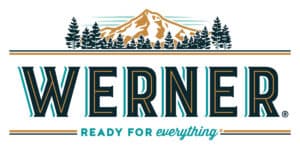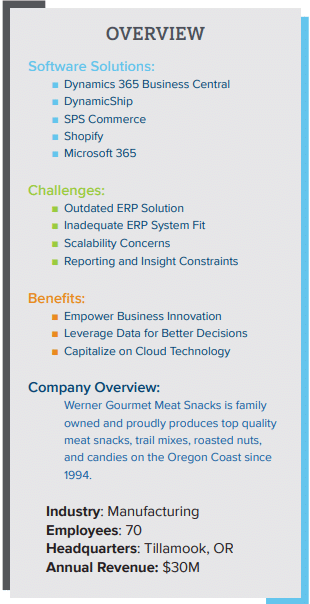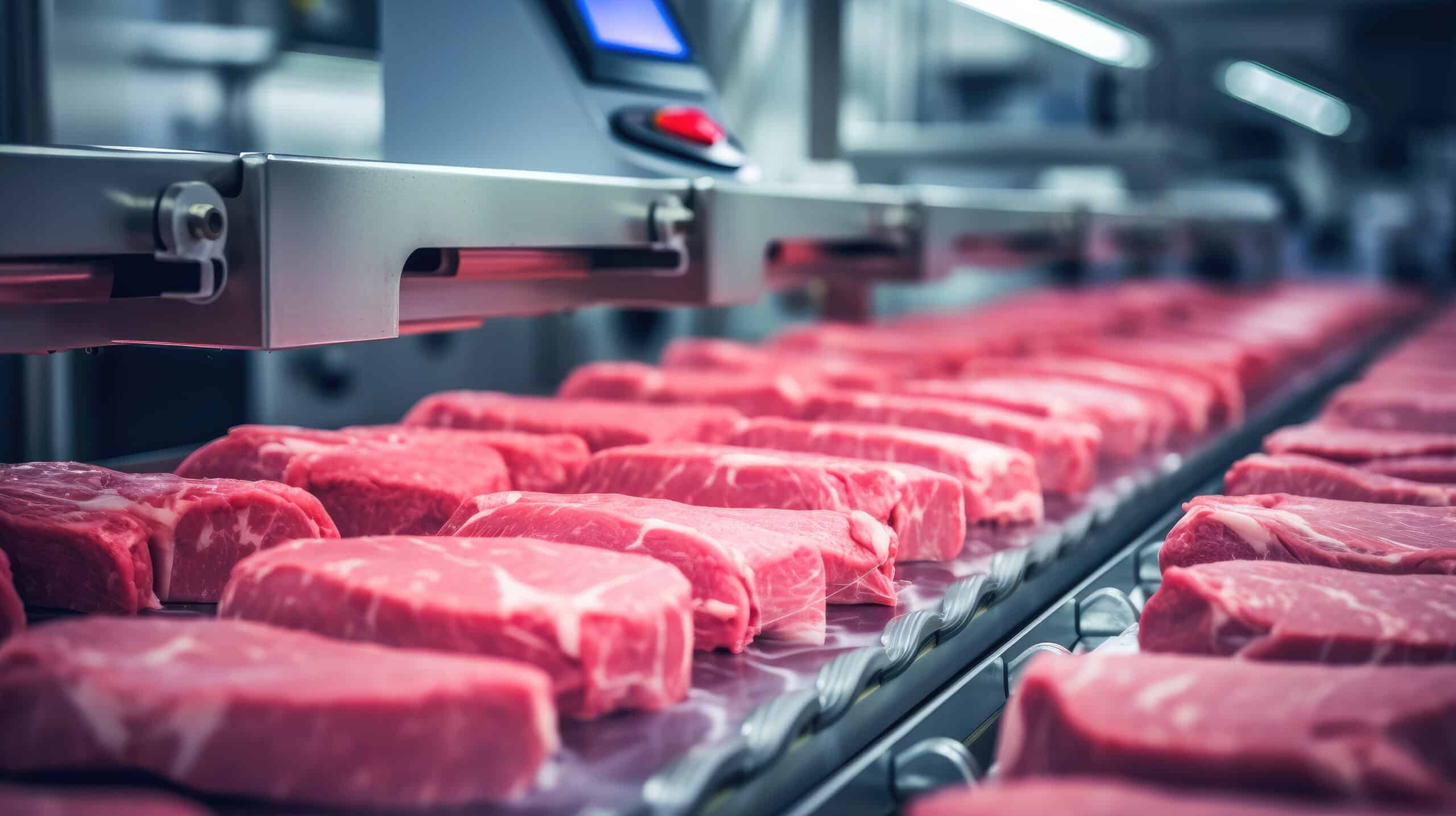Werner Gourmet Meats’ Transformation Journey
Learn how Werner Gourmet Meat Snacks transitioned from traditional methods to modern, tech driven processes.
Table of Content
Werner Gourmet Meat Snacks, a family-run business, embarked on a journey from its humble origins in the owner’s garage to a well recognized brand in the meat snacks market. Famed for their jerky, meat snacks, nuts, and candies, the Werner family has grown the brand to a national level.
origins in the owner’s garage to a well recognized brand in the meat snacks market. Famed for their jerky, meat snacks, nuts, and candies, the Werner family has grown the brand to a national level.
For three years, the company depended on a legacy ERP system, but it became evident that its old-fashioned architecture and restricted functionalities were causing several issues. They faced issues due to the poor implementation. Additionally, the company operates in a heavily regulated environment, emphasizing the importance of smooth and efficient workflows. The constraints posed by their ERP solution made it challenging for the company to ensure they adhered to these regulations, thereby posing further risks to the business’s operations.

When the pandemic struck, the global supply chain crumbled, presenting unforeseen challenges. In this tumultuous environment, many companies who specialized in private label jerky products were hit hard. Larger corporations, constrained by the disrupted supply chain, had to prioritize their own labels over the smaller private ones.
Werner, in contrast, had always maintained a sizable inventory. This foresight proved invaluable during the supply chain crisis. They swiftly pivoted to produce jerky not just for themselves but for many others affected by the disruptions. The results were phenomenal – Werner witnessed a doubling in sales volume in under three years. The company’s growth was explosive.
Riding this wave of success, Werner undertook significant expansion efforts. They constructed a new warehouse, established a state-of-the-art cold storage facility, and expanded their workforce. However, amidst this rapid expansion, they continued to grapple with a major internal challenge: an inefficient ERP system.
The team at Werner recognized the need for a more advanced technology solution to help manage their manufacturing, sales, and finances. With many paper-based manual processes, they were not able to track steps in the production process. Additionally, they relied on tribal knowledge to make key production decisions, a process that had historically been effective, but would soon become a challenge at their rate of growth.
Their IT Director and Network Administrator became the key point person to find and deploy a new ERP solution. He knew that a modern, cloud-based solution was the only option that made sense for them moving forward. He began his search for a new ERP solution and found Dynamics 365 Business Central. “I’m a big Microsoft fan and we were already using Microsoft products like Office and Exchange, so it just made sense,” said the IT Director.
With Dynamics 365 Business Central, they focused on modernizing and streamlining processes around:
“If you’re doing this process manually like we were, and you miss something and you end up running out, there’s a huge potential loss of revenue there.”
– IT Director
Werner Gourmet Meat Snacks reached out to Microsoft to learn more about Dynamics 365 Business Central. Microsoft provided a list of recommended partners with Velosio topping the list.
“We originally wanted a partner with a local office. In the end that didn’t really matter. It cost a little more to get the team on site, but it ended up not being a huge deal. Because everything is cloud based and screen sharing has come so far, it wasn’t an issue there wasn’t someone nearby,” said their IT Director.
After talking with the team at Velosio, the Werner team felt confident Velosio had the industry and technology experience to make sure the project was a success.
In their old ERP system, they would assess the consumption rates of raw ingredients like pork, beef, casings, and seasonings. They then generated a report indicating what was used, translated that to a daily rate, and then multiplied it by the lead time to determine the target inventory number. To make updates, a spreadsheet was provided, requiring manual adjustments to reorder points and maximum inventory figures for each item individually.
Velosio introduced a tool that streamlined this process. With the ability to specify a date range, the tool automatically calculates daily consumption and provides factors for reordering and maximum inventory. This information is then automatically updated in the system.
“If you’re doing this process manually like we were and you miss something and you end up running out, there’s a huge potential loss of revenue there. For example, if I run out of black pepper, which goes into everything, the wheels come off the cart,” said the IT Director.
The team at Werner was planning production outside of their legacy ERP system by manually analyzing sales order demand and quantity on hand.
The long-term goal was to have a true MPS engine within Business Central that would suggest production orders and tie in all “where-used” type of navigation and production lead times.
Different production processes were in place that include simple one step routing, such as repacking items and production that resulted in by-products that are then used to create a separate item. Additionally, Werner needed a way to account for purge loss to understand how many finished goods typically come from a set starting bulk amount.
During the production process, statistics, quality control, and measurements needed were being manually tracked on log sheets or production travelers to later be filed as directed by USDA guidelines. The team at Werner saw an opportunity here to digitize that process to make it more efficient.

A logical product structure was established, considering all the stages of meat processing, from grounding, seasoning, drying, to final packaging. They introduced systemic recognition points in the process to ensure flow control. They now had procedures in place to help recognize when product should be pulled from the freezer to thaw in time for production. They could also calculate time to thaw based on type and size of product, and if the meat would be sent to their new thawing facility that allowed them to thaw at a rapid pace without impacting quality.
Production workers can now log their time directly from work centers using barcode scanners or touch screens, eliminating manual time entry errors.
A key part of Werner Gourmet Meats’ warehouse management included barcode scanners for inventory management, traceability, and operational efficiency. With barcoded products and real-time scanning capabilities, they are able to reduce order-picking errors, understand inventory levels and the production process, and accelerate order-to-shipment times. Within the warehouse, processes were put in place to manage cycle count and frequency, labeling by item and lot, bin replenishments from bulk locations, directed pick and put away, receiving, picking, and shipping.
Additionally, DynamicShip, which integrates with Banyan (3PL), has streamlined the shipping process significantly. In the past, the logistics coordinator would manually gather quotes from multiple carriers. Now, with just a single click, they can obtain quotes from all carriers and choose the most suitable option. This efficiency has resulted in substantial time and cost savings in shipping.
Werner utilized SPS Commerce for EDI transactions, but without an integration to their prior ERP system, orders needed to be manually downloaded from SPS and then manually updated and input back into the SPS portal. Now with Business Central, their EDI capabilities are integrated and fully automated, eliminating manual data entry.
Their online ecommerce store, built on Shopify, processes an average of 350 orders annually. Tasks like item maintenance, customer details, pricing, and sales orders were being processed and managed manually. With the integration from Business central to Shopify, these manual activities can be eliminated.

With real-time production data, managers and leaders can monitor work in progress in real-time, providing more accurate insights into production processes, identifying bottlenecks, and ensuring timely decision making.
Additionally, they have the ability to truly understand their production levels, sales demand, and generate reports on KPIs that have direct impact on their business. Additional reports were built to meet the specific needs of the Werner team. These reports gave insights to salesperson commissions, broker commissions, and annual sales reports.
Due to the amount of change brought on during the ERP implementation project, the Velosio and Werner team recognized the need for change management to ensure employees across their organization were trained and felt they were part of the success of the project. Time was spent to ensure all employees, from the back office to the production floor, felt comfortable with the new business processes and the technology being implemented to support those processes.
A ‘go-live’ date was set to transition to Dynamics 365 Business Central. However, after a mock go-live, the team realized they weren’t ready. This trial-and-error approach helped highlight areas that needed updated and led to a more successful implementation go-live.
“We took our time and got it right. In the end, we spent less than we had planned. Our lead customer service representative has been through two other ERP roll outs at different companies. She came into my office and told me that this was the smoothest go-live she had ever been a part of,” remarked the IT Director.
Once live, the Werner team moved away from paper and all financials, sales management, operations, and manufacturing were brought into Business Central. Working completely on the Microsoft platform, users are able to not only use Business Central, but also Excel, Word, Outlook, and other tools they have always relied on. With the ability to use Excel directly in Business Central, users were able to ramp up and adopt the new system faster.
Werner has moved the management of their Microsoft licenses to Velosio, utilizing the Hub marketplace to add or remove licenses at any time. They plan on moving all network drives to SharePoint.
“Twenty years ago the cloud wasn’t stable enough and there were legitimate reasons to maintain your own servers. Now we’re trying to actively get off servers.”
The warranty for their on-site servers expire in 2025 and the Werner team plans on moving everything, including active directory, to Azure at that time to take advantage of cloud stability and cost savings related to bandwidth and storage.
“There is no way I could ever devote enough security resources to harden the company to the level that someone like Microsoft can do. My data is more secure on your servers than it could ever possibly be on an in-house server,” remarked the IT Director. “We have backups for all of our Microsoft products – OneDrive, email, it all gets synced constantly. But at this point I trust the cloud more than I trust a server in my own building because of the security risk.”
Werner Gourmet Meats’ transformation journey is a testament to the power of recognizing operational inefficiencies and leveraging technology and process engineering to pave the way for growth and efficiency. Their success story serves as an inspiration for businesses looking to transition from traditional methods to modern, tech-driven processes.
Talk to us about how Velosio can help you realize business value faster with end-to-end solutions and cloud services.
"*" indicates required fields